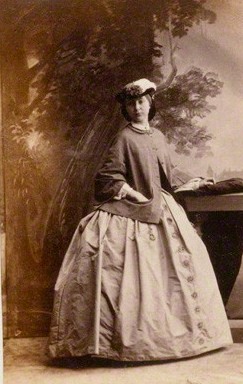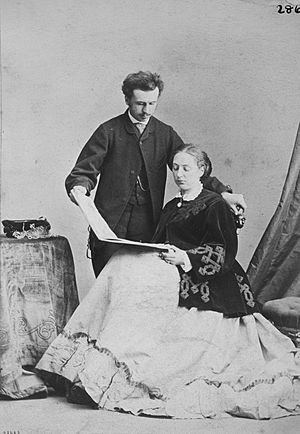Katharine Russell, Viscountess Amberley facts for kids
Quick facts for kids
Viscountess Amberley
|
|
|---|---|

Albumen print of Lady Amberley made by Camille Silvy in 1870
|
|
| Born |
Katharine Louisa Stanley
3 April 1842 |
| Died | 28 June 1874 (aged 32) |
| Nationality | British |
| Spouse(s) |
John Russell, Viscount Amberley
(m. 1864) |
| Children | 4, including Frank · Bertrand |
| Parent(s) | Edward Stanley, 2nd Baron Stanley of Alderley Henrietta Dillon-Lee |
Katharine Louisa Russell, Viscountess Amberley (born Stanley; 3 April 1842 – 28 June 1874), often called Kate, was an important British activist. She worked to gain voting rights for women. She was also the mother of the famous thinker Bertrand Russell.
Who Was Katharine Russell?

Katharine Russell was born on April 3, 1842. Her father, Edward Stanley, 2nd Baron Stanley of Alderley, was a politician. Her mother, Henrietta Stanley, worked to improve women's education.
Katharine was one of ten children. Her sisters included Rosalind Howard, Countess of Carlisle, who also fought for women's rights. Another sister, Maude Stanley, helped young people.
On November 8, 1864, Katharine married John Russell, Viscount Amberley. His father, John Russell, 1st Earl Russell, had been a prime minister. Katharine and John had four children. Their first son, John Francis Stanley, was born in 1865. Twins, Rachel Lucretia and a stillborn sister, arrived in 1868. Their last child, Bertrand Arthur William, was born in 1872.
Fighting for Women's Rights
Lady Amberley was a strong supporter of women's rights. She believed women should have the same opportunities as men. She encouraged women to study medicine. For example, she helped a medical student named Emily Bovell. She also hired Elizabeth Garrett Anderson, one of the first female doctors, as her own physician.
In 1865, she met Helen Taylor, another women's rights activist. The next year, Lady Amberley signed a petition asking for women's right to vote. In 1867, she traveled to North America with her husband. They visited Canada and the United States. In the U.S., they met Lucretia Mott, a famous American activist. Lady Amberley even named her daughter after Lucretia Mott.
In 1870, Lady Amberley became the president of a group called the Bristol and West of England Women's Suffrage Society. She worked hard for equal pay for women. She also pushed for women to get good education and be allowed to work in all types of jobs.
Lady Amberley was not afraid to speak her mind. After she gave a speech in 1870, Queen Victoria was reportedly upset. The Queen thought Lady Amberley should be punished for speaking out.
Her Final Years
In 1874, Lady Amberley became sick with diphtheria. This was a serious illness at the time. She caught it from her daughter, who died five days later. Lady Amberley passed away on June 28, 1874.
Her death deeply affected her husband. He decided to have her body cremated, which was very unusual then. Her remains were first placed near their home in Wye Valley. Her daughter's remains were also there. No religious ceremony was held. Two years later, after her husband also died, all three were moved to the Russell family burial place in Chenies.
 | Delilah Pierce |
 | Gordon Parks |
 | Augusta Savage |
 | Charles Ethan Porter |

